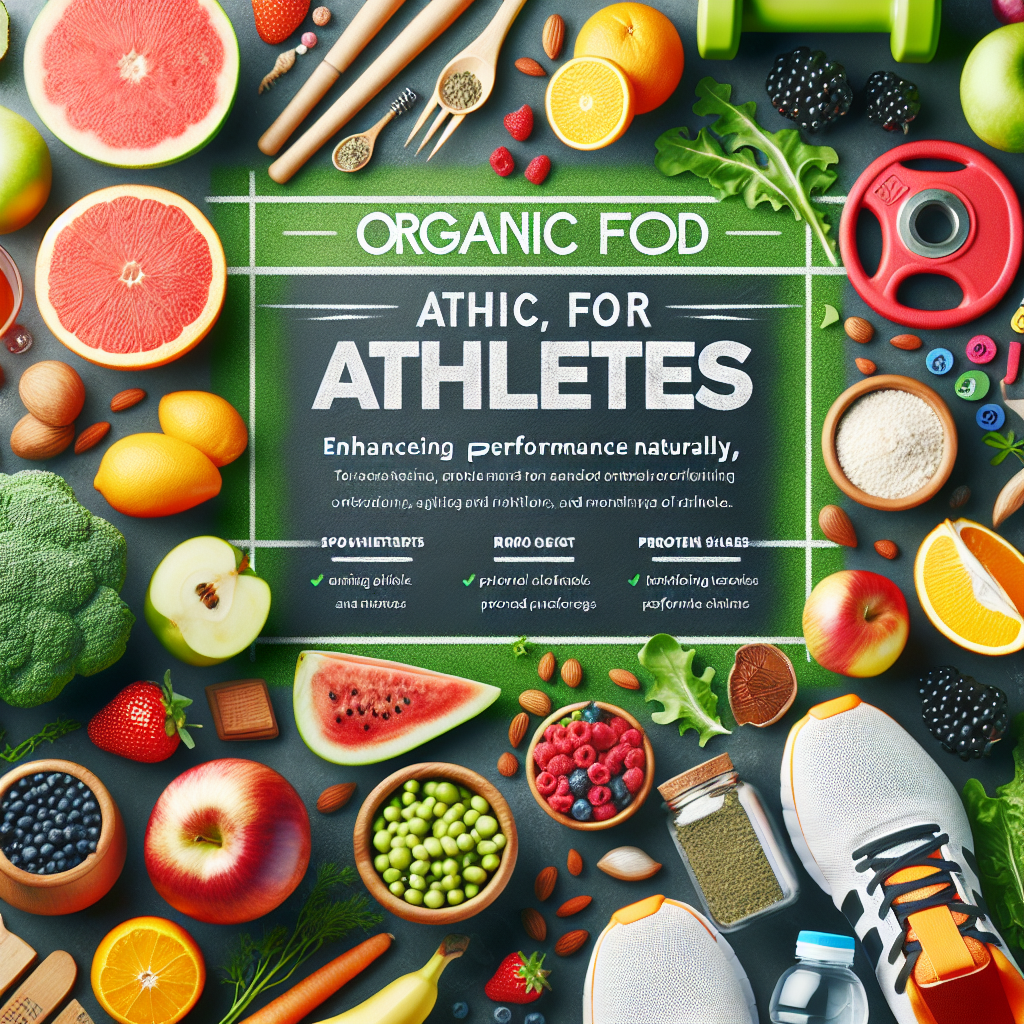Introduction to Organic Food for Athletes

In today’s competitive world of sports, athletes constantly seek effective ways to enhance their performance and recovery. One such avenue that has gained significant attention is the role of diet, specifically organic food. As athletes push their bodies to the limits, the quality of their nutrition becomes a crucial factor in their success. Organic food, which is produced without synthetic pesticides, fertilizers, genetically modified organisms (GMOs), and often with more sustainable farming practices, is believed to offer a cleaner, more nutrient-dense option compared to conventionally grown food. But what makes organic food particularly beneficial for athletes? Let’s delve into why athletes should consider an organic diet and how it can enhance their performance and recovery.
Why Athletes Should Consider an Organic Diet
Nutrient Density and Quality
Organic foods are often touted for their higher nutrient content compared to conventionally grown foods. Several studies have suggested that organic fruits and vegetables may contain higher levels of certain nutrients such as antioxidants, vitamins, and minerals. For instance, a meta-analysis published in the “British Journal of Nutrition” found that organic crops contain significantly higher concentrations of antioxidants and lower levels of toxic heavy metals like cadmium. For athletes, who need an abundance of vitamins and minerals to support their high metabolic demands and muscle repair, nutrient-dense foods can be a game-changer.
Reduced Exposure to Pesticides and Chemicals
Conventional farming often involves the use of synthetic pesticides and fertilizers which can leave residues on food. Long-term exposure to these chemicals has been linked to various health issues, including hormonal imbalances and decreased immune function. For athletes, whose bodies are already under significant stress from intense training, reducing exposure to harmful chemicals can help maintain a healthy immune system and overall well-being. An organic diet minimizes the intake of these potentially harmful substances, which can be particularly important for athletes who need to stay in peak health.
Improved Digestive Health
Organic foods are typically free from synthetic additives such as artificial colors, flavors, and preservatives. These additives can sometimes cause digestive issues such as bloating, gas, and inflammation. An organic diet may promote better digestive health by providing cleaner foods that are easier on the gut. A healthy digestive system is essential for athletes as it ensures proper nutrient absorption and helps prevent gastrointestinal issues that can hinder performance.
Enhanced Recovery
Recovery is a critical part of an athlete’s training regimen. Organic foods are rich in antioxidants, which help combat oxidative stress caused by intense physical activity. This oxidative stress can lead to muscle damage and inflammation. By consuming a diet high in antioxidants from organic fruits and vegetables, athletes can potentially reduce inflammation and speed up recovery times. Additionally, organic animal products such as grass-fed beef and free-range eggs tend to have a healthier fatty acid profile, including higher levels of omega-3 fatty acids, which are known for their anti-inflammatory properties.
How Organic Food Can Enhance Athletic Performance
Balanced Energy Levels
Organic foods, particularly those that are unprocessed and whole, provide a steady source of energy. For instance, organic whole grains such as quinoa and brown rice offer complex carbohydrates that are digested slowly, providing a sustained release of energy. This is crucial for athletes who need stable energy levels throughout their training sessions and competitions.
Optimized Protein Intake
Protein is a key macronutrient for athletes, supporting muscle repair and growth. Organic sources of protein, such as grass-fed beef, organic poultry, and wild-caught fish, are often leaner and contain higher levels of beneficial nutrients like omega-3 fatty acids. Moreover, organic dairy products such as milk and yogurt can be excellent sources of high-quality protein without the added hormones or antibiotics that are sometimes found in conventional dairy.
Hydration and Electrolyte Balance
Proper hydration is vital for athletic performance. Organic fruits and vegetables such as watermelon, cucumbers, and oranges are high in water content and provide natural electrolytes like potassium. Incorporating these organic foods into an athlete’s diet can aid in maintaining hydration and electrolyte balance, which is essential for preventing cramps and maintaining endurance during prolonged physical activity.
Essential Organic Foods for Athletes
Organic Fruits and Vegetables
- Berries: Blueberries, strawberries, and raspberries are rich in antioxidants and vitamins that help combat oxidative stress and inflammation.
- Leafy Greens: Spinach, kale, and Swiss chard are packed with vitamins A, C, K, and minerals like iron and calcium, which support bone health and muscle function.
- Bananas: A great source of potassium and carbohydrates, bananas are perfect for pre- or post-workout snacks to replenish energy and prevent muscle cramps.
Organic Protein Sources
- Grass-Fed Beef: Contains higher levels of omega-3 fatty acids and conjugated linoleic acid (CLA), which can aid in muscle recovery and fat metabolism.
- Organic Chicken and Turkey: Lean sources of protein that support muscle repair and growth without the added hormones or antibiotics found in conventionally raised poultry.
- Wild-Caught Fish: Salmon, mackerel, and sardines are rich in omega-3 fatty acids which help reduce inflammation and support cardiovascular health.
Organic Whole Grains
- Quinoa: A complete protein source containing all nine essential amino acids, suitable for vegetarian athletes.
- Brown Rice: Provides complex carbohydrates for sustained energy and contains B vitamins which help in energy metabolism.
- Oats: High in fiber and complex carbohydrates, making them ideal for a pre-workout meal that provides a slow release of energy.
Organic Dairy and Alternatives
- Organic Milk: A good source of protein, calcium, and vitamin D, which are crucial for muscle function and bone health.
- Greek Yogurt: High in protein and probiotics which can support digestive health.
- Almond Milk: A dairy-free alternative that is often fortified with calcium and vitamin D for those who are lactose intolerant or prefer plant-based options.
Conclusion
Incorporating organic food into an athlete’s diet can offer numerous benefits, from higher nutrient content and reduced exposure to harmful chemicals to improved digestive health and enhanced recovery. By focusing on nutrient-dense organic foods such as fruits, vegetables, lean proteins, and whole grains, athletes can potentially improve their performance, maintain a healthier body, and achieve their athletic goals more naturally. As always, it’s important for athletes to consult with a nutritionist or dietitian to tailor their diet to their specific needs and ensure they are getting a balanced intake of all necessary nutrients.
While the initial cost of organic food may be higher, the long-term benefits for an athlete’s health and performance could make it a worthwhile investment. Making the switch to an organic diet might be a step in the right direction for those looking to enhance their athletic performance and overall well-being.
